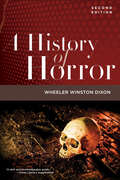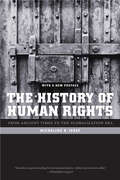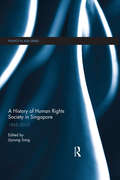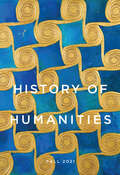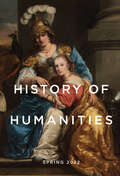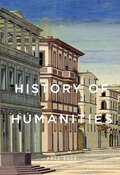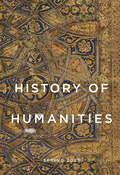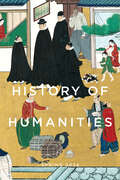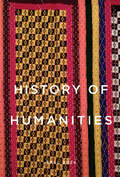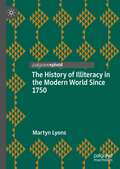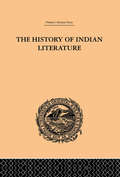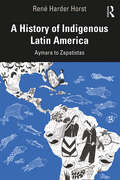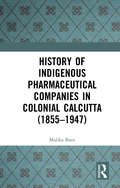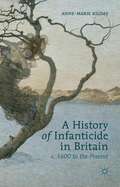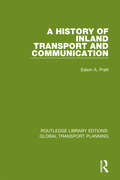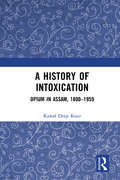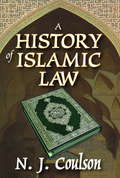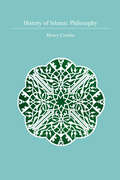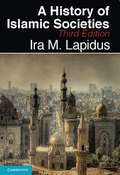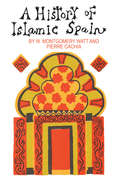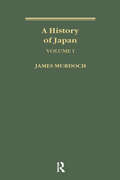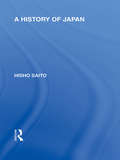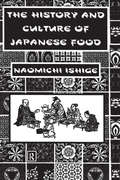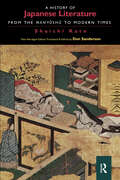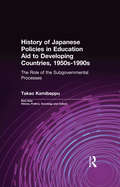- Table View
- List View
A History of Horror, 2nd Edition
by Wheeler Winston DixonEver since horror leapt from popular fiction to the silver screen in the late 1890s, viewers have experienced fear and pleasure in exquisite combination. Wheeler Winston Dixon's fully revised and updated A History of Horror is still the only book to offer a comprehensive survey of this ever-popular film genre. Arranged by decades, with outliers and franchise films overlapping some years, this one-stop sourcebook unearths the historical origins of characters such as Dracula, Frankenstein, and the Wolfman and their various incarnations in film from the silent era to comedic sequels. In covering the last decade, this new edition includes coverage of the resurgence of the genre, covering the swath of new groundbreaking horror films directed by women, Black and queer horror films, and a new international wave in body horror films. A History of Horror explores how the horror film fits into the Hollywood studio system, how the distribution and exhibition of horror films have changed in a post-COVID world, and how its enormous success in American and European culture expanded globally over time. Dixon examines key periods in the horror film-in which the basic precepts of the genre were established, then banished into conveniently reliable and malleable forms, and then, after collapsing into parody, rose again and again to create new levels of intensity and menace. A History of Horror, supported by rare stills from classic films, brings over sixty timeless horror films into frightfully clear focus, zooms in on today's top horror Web sites, and champions the stars, directors, and subgenres that make the horror film so exciting and popular with contemporary audiences.
The History of Human Rights
by Micheline IshayMicheline Ishay recounts the dramatic struggle for human rights across the ages in a book that brilliantly synthesizes historical and intellectual developments from the Mesopotamian Codes of Hammurabi to today's era of globalization. As she chronicles the clash of social movements, ideas, and armies that have played a part in this struggle, Ishay illustrates how the history of human rights has evolved from one era to the next through texts, cultural traditions, and creative expression. Writing with verve and extraordinary range, she develops a framework for understanding contemporary issues from the debate over globalization to the intervention in Kosovo to the climate for human rights after September 11, 2001. The only comprehensive history of human rights available, the book will be essential reading for anyone concerned with humankind's quest for justice and dignity. Ishay structures her chapters around six core questions that have shaped human rights debate and scholarship: What are the origins of human rights? Why did the European vision of human rights triumph over those of other civilizations? Has socialism made a lasting contribution to the legacy of human rights? Are human rights universal or culturally bound? Must human rights be sacrificed to the demands of national security? Is globalization eroding or advancing human rights? As she explores these questions, Ishay also incorporates notable documents--writings, speeches, and political statements--from activists, writers, and thinkers throughout history.
A History of Human Rights Society in Singapore: 1965-2015 (Politics in Asia)
by Jiyoung SongTo celebrate Singapore’s fiftieth anniversary for its independence from Malaysia in 2015, 35 students, academics and activists came together to discuss and write about pioneering Singaporean human rights activists and their under-reported stories in Singapore. The city-state is known for its remarkable economic success while having strict laws on individual freedom in the name of national security, public order and racial harmony. Singapore’s tough stance on human rights, however, does not negate the long and persistent existence of a human rights society that is little known to the world until today. This volume, composed of nine distinctive chapters, records a history of human rights activists, their campaigns, main contentions with the government, survival strategies and other untold stories in Singapore’s first 50 years of state-building.
History of Humanities, volume 6 number 2 (Fall 2021)
by History of HumanitiesThis is volume 6 issue 2 of History of Humanities. History of Humanities, along with the Society for the History of the Humanities, takes as its subject the history of a wide variety of disciplines including archaeology, art history, historiography, linguistics, literary studies, musicology, philology, and media studies, tracing these fields from their earliest developments, through their formalization into university disciplines, and to the modern day. By exploring the history of humanities across time and civilizations and along with their sociopolitical and epistemic implications, the journal takes a critical look at the concept of humanities itself.
History of Humanities, volume 7 number 1 (Spring 2022)
by History of HumanitiesThis is volume 7 issue 1 of History of Humanities. History of Humanities, along with the Society for the History of the Humanities, takes as its subject the history of a wide variety of disciplines including archaeology, art history, historiography, linguistics, literary studies, musicology, philology, and media studies, tracing these fields from their earliest developments, through their formalization into university disciplines, and to the modern day. By exploring the history of humanities across time and civilizations and along with their sociopolitical and epistemic implications, the journal takes a critical look at the concept of humanities itself.
History of Humanities, volume 7 number 2 (Fall 2022)
by History of HumanitiesThis is volume 7 issue 2 of History of Humanities. History of Humanities, along with the Society for the History of the Humanities, takes as its subject the history of a wide variety of disciplines including archaeology, art history, historiography, linguistics, literary studies, musicology, philology, and media studies, tracing these fields from their earliest developments, through their formalization into university disciplines, and to the modern day. By exploring the history of humanities across time and civilizations and along with their sociopolitical and epistemic implications, the journal takes a critical look at the concept of humanities itself.
History of Humanities, volume 8 number 1 (Spring 2023)
by History of HumanitiesThis is volume 8 issue 1 of History of Humanities. History of Humanities, along with the Society for the History of the Humanities, takes as its subject the history of a wide variety of disciplines including archaeology, art history, historiography, linguistics, literary studies, musicology, philology, and media studies, tracing these fields from their earliest developments, through their formalization into university disciplines, and to the modern day. By exploring the history of humanities across time and civilizations and along with their sociopolitical and epistemic implications, the journal takes a critical look at the concept of humanities itself.
History of Humanities, volume 9 number 1 (Spring 2024)
by History of HumanitiesThis is volume 9 issue 1 of History of Humanities. History of Humanities, along with the Society for the History of the Humanities, takes as its subject the history of a wide variety of disciplines including archaeology, art history, historiography, linguistics, literary studies, musicology, philology, and media studies, tracing these fields from their earliest developments, through their formalization into university disciplines, and to the modern day. By exploring the history of humanities across time and civilizations and along with their sociopolitical and epistemic implications, the journal takes a critical look at the concept of humanities itself.
History of Humanities, volume 9 number 2 (Fall 2024)
by History of HumanitiesThis is volume 9 issue 2 of History of Humanities. History of Humanities, along with the Society for the History of the Humanities, takes as its subject the history of a wide variety of disciplines including archaeology, art history, historiography, linguistics, literary studies, musicology, philology, and media studies, tracing these fields from their earliest developments, through their formalization into university disciplines, and to the modern day. By exploring the history of humanities across time and civilizations and along with their sociopolitical and epistemic implications, the journal takes a critical look at the concept of humanities itself.
The History of Illiteracy in the Modern World Since 1750
by Martyn LyonsThis Palgrave Pivot examines the history of literacy with illiterate and semi-literate people in mind, and questions the clear division between literacy and illiteracy which has often been assumed by social and economic historians. Instead, it turns the spotlight on all those in-between, the millions who had some literacy skills, but for whom reading and writing posed difficulties. Its main focus is on those we have often labelled ‘illiterates’, rather than those who enjoyed full competence in reading and writing in modern society. In offering a historical perspective on the ‘problem’ of illiteracy in the modern world, it also questions some enduring myths surrounding the phenomenon. This book therefore has a revisionist objective: it intends to challenge conventional wisdom about illiteracy.
The History of Indian Literature
by Albrecht WeberFirst Published in 2000. This title is Volume 10 in the 14-volume series titled India: Language and Literature, one of the Trüber's Oriental Series. The lectures in this volume were presented to the narrow circle fellows in this field of study. This publication will now reach the wider circle of those interested and those researchers of the history of literature generally. The form in which these lectures appear is essentially the same in which they were delivered while incidental remarks are given as footnotes and new matter has been added.
A History of Indigenous Latin America: Aymara to Zapatistas
by René Harder HorstA History of Indigenous Latin America is a comprehensive introduction to the people who first settled in Latin America, from before the arrival of the Europeans to the present. Indigenous history provides a singular perspective to political, social and economic changes that followed European settlement and the African slave trade in Latin America. Set broadly within a postcolonial theoretical framework and enhanced by anthropology, economics, sociology, and religion, this textbook includes military conflicts and nonviolent resistance, transculturation, labor, political organization, gender, and broad selective accommodation. Uniquely organized into periods of 50 years to facilitate classroom use, it allows students to ground important indigenous historical events and cultural changes within the timeframe of a typical university semester. Supported by images, textboxes, and linked documents in each chapter that aid learning and provide a new perspective that broadly enhances Latin American history and studies, it is the perfect introductory textbook for students.
History of Indigenous Pharmaceutical Companies in Colonial Calcutta (1855–1947)
by Malika BasuIn the context of life and civilization, the pharmaceutical industry is as old as human existence. Since time immemorial India had its own enriched indigenous tradition of medicine. The development of alchemy and its application for human welfare was also an important step in Indian scientific tradition. The present monograph is an innovative attempt to understand the history of the indigenous pharmaceutical companies in Calcutta during the colonial times. Here pharmaceutical companies have been viewed as an illuminating lens to understand the interconnectedness between Indian traditions of thought and Western science and subsequent development of pharmaceutical industry in colonial India. The entire gamut of discussion centres around the issues of medical education, medical services, public health, pharmaceutical profession and politico-economic contexts of the development of pharmaceutical industry in colonial India. Three indigenous pharmaceuticals namely – Butto Krishna Paul & Co., Bengal Chemical & Pharmaceutical Works Limited, and East India Pharmaceutical Works Limited have been studied. The study not only portrays the politico-economic background to the emergence of the pharmaceutical industry in colonial India but links it to the economic nationalism and the quest for self-sufficiency among Indian nationalists and entrepreneurs. The pharmaceutical industry in India can be symbolic of a cultural response to modern science which was to pave the subsequent trajectory of national scientific endeavours in India.Please note: Taylor & Francis does not sell or distribute the Hardback in India, Pakistan, Nepal, Bhutan, Bangladesh and Sri Lanka.
A History of Infanticide in Britain, c. 1600 to the Present
by Anne-Marie KildayThe killing of new-born children is an intensely emotional and emotive subject. The hidden nature of this crime has made it an area incredibly difficult subject area for historians to approach up until now. This work provides the first detailed history of infanticide in mainland Britain from 1600 to the modern era.
A History of Inland Transport and Communication (Routledge Library Edtions: Global Transport Planning #16)
by Edwin A. PrattOriginally published in 1912, this book with extensive source footnotes and bibliography follows the evolution and development of roads, rivers, canals, tramways, buses and cycles. The role that the development of transport played in the growth and expansion of trade and industry and on the general economic and social conditions of the country is one of the main issues that is discussed. Other themes which are examined are the electrification of the railways, railways and the state, railway rates and charges and early trading conditions.
A History of Intoxication: Opium in Assam, 1800–1959
by Kawal Deep KourThis volume unearths the emerging pattern of consumption of opium in colonial Assam and the creation of drug-dependency in a social context. It analyses the competing forces of the empire which played a key role in the production and distribution of opium; national politics alongside international drug diplomacy and how these together shaped the discourse of opium in Assam; the wider implications of opium production and consumption in the agrarian economy and the narrative of the nationalist critique of intoxication. Please note: Taylor & Francis does not sell or distribute the Hardback in India, Pakistan, Nepal, Bhutan, Bangladesh and Sri Lanka.
A History of Islamic Law (Islamic Surveys Ser.)
by N. CoulsonLawyers, according to Edmund Burke, are bad historians. He was referring to an unwillingness, rather than an inaptitude, on the part of early nineteenth-century English lawyers to concern themselves with the past: for contemporary jurisprudence was a pure and isolated science wherein law appeared as a body of rules, based upon objective criteria, whose nature and very existence were independent of considerations of time and place. Despite the influence of the historical school of Western jurisprudence, Burke's observation is generally valid for Middle East studies. Muslim jurisprudence in its traditional form provides an extreme example of a legal science divorced from historical considerations. Law, in classical Islamic theory, is the revealed will of God, a divinely ordained system preceding, and not preceded by, the Muslim state controlling, but not controlled by, Muslim society. There can thus be no relativistic notion of the law itself evolving as an historical phenomenon closely tied with the progress of society. The increasing number of nations that are largely Muslim or have a Muslim head of state, emphasizes the growing political importance of the Islamic world, and, as a result, the desirability of extending and expanding the understanding and appreciation of their culture and belief systems. Since history counts for much among Muslims and what happened in 632 or 656 is still a live issue, a journalistic familiarity with present conditions is not enough; there must also be some awareness of how the past has molded the present. This book is designed to give the reader a clear picture. But where there are gaps, obscurities, and differences of opinion, these are also indicated.
History Of Islamic Philosophy
by Henry CorbinFirst published in 1993. Published here for the first time in English, this highly important work by Henry Corbin, the Islamic scholar, philosopher and historian of religion, is a definitive interpretation of traditional Islamic philosophy from the beginning to the present day. In this authoritative volume, Corbin makes clear the great themes of the doctrinal and mystical vision of lslamic philosophy through a wealth of comparative parallels and in relation to the most profound currents of Western philosophy. In Part One, From the Beginning Down to the Death of Averroes, Corbin considers the Sources of Philosophical Meditation in Islam; Shi ism and Prophetic Philosophy; the Sunni Kalam; Philosophy and the Natural Sciences; the Hellenizing Philosophers; Sufism; Al-Suhrawardi and the Philosophy of Light, and the Andalusian Tradition. In Part Two, From the Death of Averroes to the Present Day, he examines Sunni Thought, the Metaphysics of Sufism, and Shiite Thought. Corbin's History of Islamic Philosophy is both an inspirational book and an essential work of reference, enabling readers to discover themselves the richness of this body of thought.
A History of Islamic Societies
by Ira LapidusThis new edition of one of the most widely used course books on Islamic civilizations around the world has been substantially revised to incorporate the new scholarship and insights of the last twenty-five years. Ira Lapidus' history explores the beginnings and transformations of Islamic civilizations in the Middle East and details Islam's worldwide diffusion. The history is divided into four parts. Part I is a comprehensive account of pre-Islamic late antiquity; the beginnings of Islam; the early Islamic empires; and Islamic religious, artistic, legal and intellectual cultures. Part II deals with the construction in the Middle East of Islamic religious communities and states to the fifteenth century. Part III includes the history to the nineteenth century of Islamic North Africa and Spain; the Ottoman, Safavid and Mughal empires; and other Islamic societies in Asia and Africa. Part IV accounts for the impact of European commercial and imperial domination on Islamic societies and traces the development of the modern national state system and the simultaneous Islamic revival from the early nineteenth century to the present.
A History of Islamic Spain (Islamic Surveys Ser.)
by Pierre CachiaThe period of Muslim occupation in Spain represents the only significant contact Islam and Europe was ever to have on European soil. In this important as well as fascinating study, Watt traces Islam's influence upon Spain and European civilization - from the collapse of the Visigoths in the eighth century to the fall of Granada in the fifteenth, and considers Spain's importance as a part of the Islamic empire. Particular attention is given to the golden period of economic and political stability achieved under the Umayyads. Without losing themselves in detail and without sacrificing complexity, the authors discuss the political, social, and economic continuity in Islamic Spain, or al-Andalus, in light of its cultural and intellectual effects upon the rest of Europe. Medieval Christianity, Watt points out, found models of scholarship in the Islamic philosophers and adapted the idea of holy war to its own purposes while the final reunification of Spain under the aegis of the Reconquista played a significant role in bringing Europe out of the Middle Ages. A survey essential to anyone seeking a more complete knowledge of European or Islamic history, the volume also includes sections on literature and philology by Pierre Cachia. This series of Islamic surveys is designed to give the educated reader something more than can be found in the usual popular books. Each work undertakes to survey a special part of the field, and to show the present stage of scholarship here. Where there is a clear picture this will be given; but where there are gaps, obscurities and differences of opinion, these will also be indicated. Full and annotated bibliographies will afford guidance to those who want to pursue their studies further. There will also be some account of the nature and extent of the source material. The series is addressed in the first place to the educated reader, with little or no previous knowledge of the subject; its character is such that it should be of value also to
A History of Japan: During The Century Of Early Foreign Intercourse (1542-1651) (classic Reprint)
by James MurdochFirst published in 1903, this three volume set deals with the history of Japan from its origins to the end of the Tokugawa Shogunate. Drawing for the first time on Japanese, European and Latin sources, this classic text was the first comprehensive study of Japanese history in English, contributing to a new understanding of Japan by Westerners at the time.Available for the first time since the 1960s, this facsimile edition includes a biographical introduction of James Murdoch's life by D. C. S. Sissons. An important document in the history of Japanese studies, this book is an enduring work by an author who became Australia's first professor of Japanese.
A History of Japan (Routledge Library Editions: Japan)
by Hisho SaitoThis volume presents the Japanese version of the history of Japan from its origins, through the subjection of Korea, the introduction of Chinese culture, rebellion in Korea, Buddhism, Taika reforms, Ainu insurrection, the founding of Kyoto as the capital, the power of Fujiwara, the founding of the Kamakura Shogunate, Hojo family, Ashikaga Shogunate, Oda & Toyotomi families, Tokugawa Shogunate, the beginning of the Meiji, relations with Korea, Russia and the Chino-Japanese war of 1894, ending with the Russo-Japanese war of 1904.
History Of Japanese Food
by IshigeFirst published in 2001. Routledge is an imprint of Taylor & Francis, an informa company.
A History of Japanese Literature: From the Manyoshu to Modern Times (A\history Of Japanese Literature Ser. #Vol. 2 (the Years Of Isolation))
by Shuichi Kato Don SandersonA new simplified edition translated by Don Sanderson. The original three-volume work, first published in 1979, has been revised specially as a single volume paperback which concentrates on the development of Japanese literature.
History of Japanese Policies in Education Aid to Developing Countries, 1950s-1990s: The Role of the Subgovernmental Processes (East Asia: History, Politics, Sociology and Culture)
by Takao KamibeppuFirst published in 2002. Routledge is an imprint of Taylor & Francis, an informa company.
